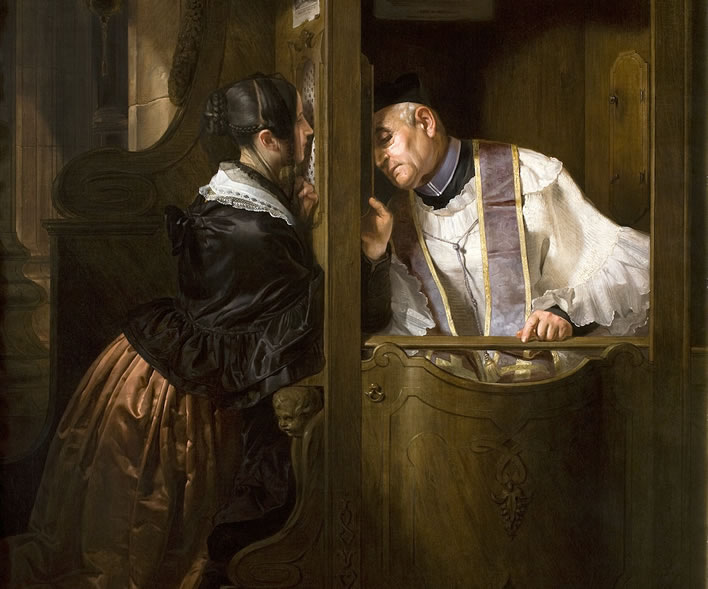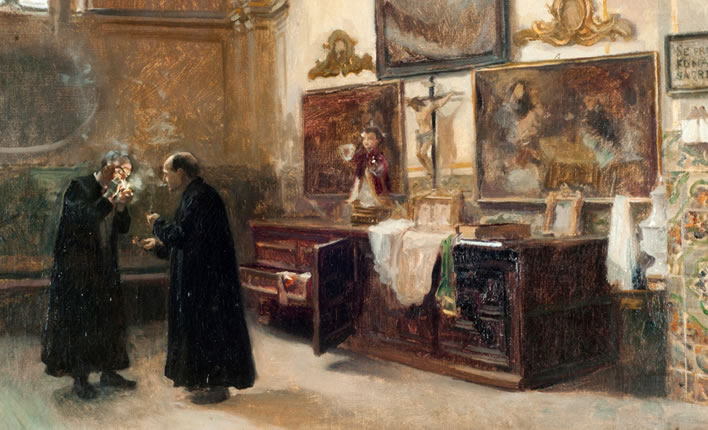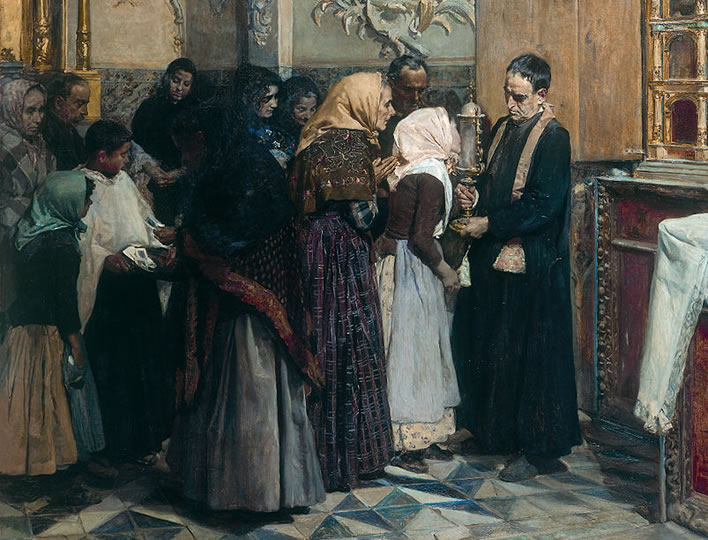The heavenly balance sheet
Posted by Richard on UTC 2016-05-01 07:44
Absolution
For the Catholic, the intention behind each act – whether good or bad – determined its value and its direction – positive or negative – which then went onto the heavenly balance sheet.
Furthermore, the Catholic Church offered a path to redeem the minus points: confession, penitence and absolution. Since the sin lay in the intention, an acknowledgement and revision of the intention through penance and absolution could magically adjust the balance sheet. This function lies deep in the heart of Catholicism, but by offering this path to counterweight sin the Catholic Church weakened the moral imperative.

La Confessione [detail] by Giuseppe Molteni (1800–1867), 1838. Image: Gallerie di Piazza Scala, Milan.
The Catholic had available the sacrament of penance of his church as a compensation for his own failings: the priest was a magician who effected the miracle of the transubstantiation and in whose hands the required power rested. One could turn to him in remorse and penitence, he offered atonement, the hope of mercy and the certainty of forgiveness and thus delivered the release from that immense tension in which it was the inescapable and immutable destiny of the Calvinist to live.[1]

In the sacristy, 1893, by Joaquín Sorolla y Bastida (1863-1923). The relaxed everyday life of the Catholic faithful within the interstices of ritual.
A Catholic life was a rollercoaster of greater or lesser ups-and-downs between sins, remorse, penitence, absolution and new sins. All these events were lived from moment to moment.[2]

Kissing the Relic, 1893, by Joaquín Sorolla y Bastida (1863-1923). Earning points for reverent practices.
Alone
None of these psychologically comforting, magical mechanisms was available to the Calvinist. Unlike the Catholic, the Calvinist's moments of weakness and foolishness could never be made good through later acts of good intention.
Calvin's God was not a bookkeeper measuring intention and recording individual sins and good works. He required from his followers a system of good works, a plan that covered the entire span of life and which stood behind every hour and every action.[3]
And the goal of this plan was to increase the glory of God on earth. In the success of that plan – a success that would come on earth and would be apparent there and not at some later time in Heaven – the faithful elect would see the confirmation of their elected status.
He that gets all he can honestly, and saves all he gets (necessary Expences excepted) will certainly become Rich; If that Being who governs the World, to whom all should look for a Blessing on their honest Endeavours, doth not in his wise Providence otherwise determine.[4]
Paradoxically, if God was no longer the bookkeeper of the individual's moral balance sheet, the individual himself had to be. In the Calvinistic style faiths, good works were not ad hoc efforts to redeem sins, they were part of a documented and systematic way of life. Individuals were encouraged to write down a plan of their intended progress in doing works for the glory of God on earth.
This was not a list of sins, of the sort that the Jesuits produced before confession. It was a table of virtues. This plan had to be implemented by diligent application and self-control and progress monitored and recorded.[5]
Above all, the individual's entire life in its every aspect had become part of a religious process.[6] Also, quite paradoxically, the individual has now effectively become a monk in the world, but one who inhabits the world and engages with it in a calling rather than withdrawing from it and all its temptations.
All the ascetic exercises, introspection, continuous devotion and unceasing care of the soul have now been redirected from the reclusive, other-worldly life to the everyday world of humans.
References
-
^
Weber p. 114.
Dem Katholiken stand die Sakramentsgnade seiner Kirche als Ausgleichsmittel eigner Unzulänglichkeit zur Verfügung: der Priester war ein Magier, der das Wunder der Wandlung vollbrachte und in dessen Hand die Schlüsselgewalt gelegt war. Man konnte sich in Reue und Bußfertigkeit an ihn wenden, er spendete Sühne, Gnadenhoffnung, Gewißheit der Vergebung und gewährte damit die Entlastung von jener ungeheuren Spannung, in welcher zu leben das unentrinnbare und durch nichts zu 1indernde Schicksal des Calvinisten war. -
^
Weber p. 114f.
Von dem katholischen, echt menschlichen Auf und Ab zwischen Sünde, Reue, Buße, Entlastung, neuer Sünde oder von einem durch zeitliche Strafen abzubüßenden, durch kirchliche Gnadenmittel zu begleichenden Saldo des Gesamtlebens war keine Rede. -
^
Weber p. 115.
Denn nur in einer fundamentalen Umwandlung des Sinnes des ganzen Lebens in jeder Stunde und jeder Handlung konnte sich das Wirken der Gnade als einer Enthebung des Menschen aus dem Status naturae in den Status gratiae bewähren. - ^ Benjamin Franklin, 'Advice to a Young Tradesman', Printed in George Fisher, The American Instructor: or Young Man's Best Companion. The Ninth Edition Revised and Corrected. Philadelphia: Printed by B. Franklin and D. Hall, at the New-Printing-Office, in Market-Street, 1748. pp. 375-7. Yale University Library
-
^
Weber p. 123.
Aber während es im Katholizismus dem Zweck der Vollständigkeit der Beichte diente oder dem 'directeur de 1'âme' die Unterlage zu seiner autoritären Leitung des Christen bzw. (meist) der Christin bot, 'fühlte sich' der reformierte Christ mit seiner Hilfe selbst 'den Puls'. Von allen bedeutenden Moraltheologen wird es erwähnt, noch Benjamin Franklins tabellarisch-statistische Buchführung über seine Fortschritte in den einzelnen Tugenden gibt ein klassisches Beispiel dafür. Und andererseits wurde das alte mittelalterliche (und schon antike) Bild von der Buchführung Gottes bei Bunyan bis zu der charakteristischen Geschmacklosigkeit gesteigert, daß das Verhältnis des Sünders zu Gott mit dem eines Kunden zum shopkeeper verglichen wird: wer einmal in die Kreide geraten ist, wird mit dem Ertrag all seiner eigenen Verdienste allenfalls die auflaufenden Zinsen, niemals aber die Hauptsumme abtragen können. Wie sein eigenes Verhalten, so kontrollierte aber der spätere Puritaner auch dasjenige Gottes und sah in allen Einzelfügungen des Lebens seinen Finger. Und, im Gegensatz zu Calvins genuiner Lehre, wüßte er daher, warum Gott diese oder jene Verfügung traf. -
^
Weber p. 123.
Die Heiligung des Lebens … konnte so fast den Charakter eines Geschäftsbetriebs annehmen. Eine penetrante Christianierung des ganzen Daseins war die Konsequenz dieser Methodik der ethischen Lebensführung, welche der Calvinismus im Gegensatz zum Luthertum erzwang.
0 Comments UTC Loaded:
Input rules for comments: No HTML, no images. Comments can be nested to a depth of eight. Surround a long quotation with curly braces: {blockquote}. Well-formed URLs will be rendered as links automatically. Do not click on links unless you are confident that they are safe. You have been warned!